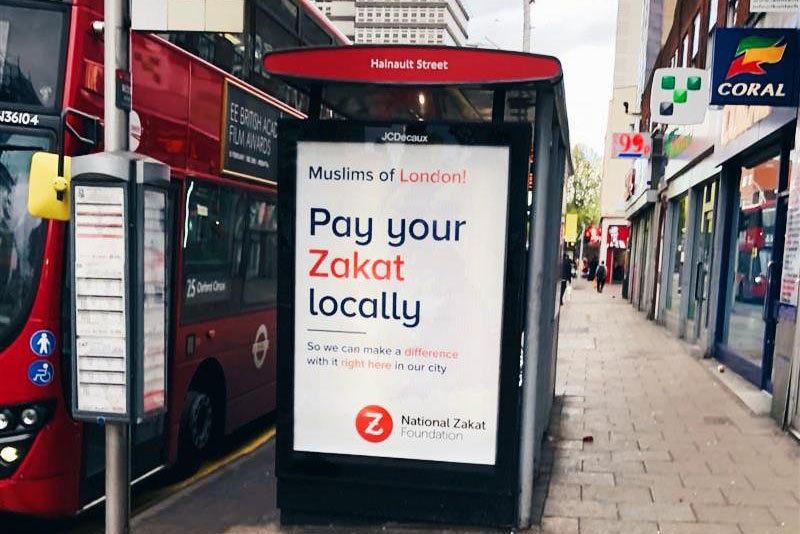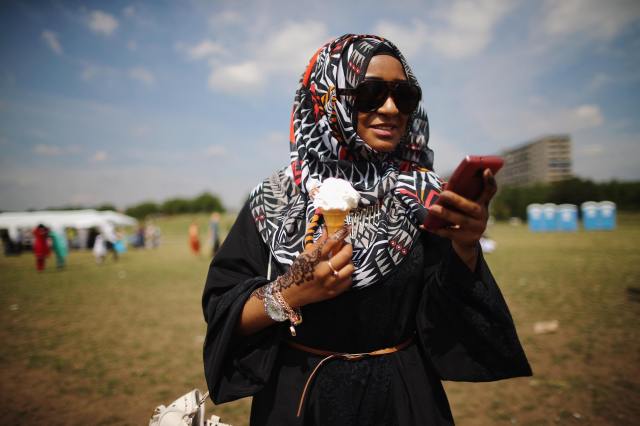A young Muslim woman at Eid celebrations in London. Credit: Dan Kitwood / Staff / Getty Images

Brits like to give to charity. When there’s a humanitarian crisis or a TV telethon, when a cousin asks us to sponsor her in a triathlon or a colleague organises a bake-off, we dig deep.
But the millions raised by the Disasters Emergency Committee – £26 million for the Rohingya Crisis, £65 million for East Africa food shortage, £30 million for Yemen – or the £38 million raised by this year’s Sport Relief pale into insignificance compared to one of Britain’s most generous seasons. Ramadan.
British Muslims give literally millions to good causes during their time of fasting and feasting. The Muslim Charities Forum estimate that, in 2016, funds raised during the month of Ramadan came to around £100 million.
This philanthropic behaviour is called zakat or the ‘poor due’ – a tax on wealth which is one of the five pillars of Islam. It is a devout response to the instruction in the Qu’ran which outlines eight categories for giving:
“Zakat expenditures are only for the poor and for the needy and for those employed to collect it and for bringing hearts together and for freeing captives and for those in debt and for the cause of Allah and for the traveller – an obligation by Allah. And Allah is Knowing and Wise.”
It’s a longstanding tradition, but a new conversation is now emerging about where the money should go. And this says a lot about how Britain’s Muslims perceive themselves.
In areas of London with a large Muslim population, you will see bus stop ads like the one below, produced by the National Zakat Foundation, encouraging Muslims to give their zakat to local causes.

This is a big departure from tradition – the National Zakat Foundation says that 98% of British zakat is directed outside the UK. For Muslims who arrived here 50 or 60 years ago, it made sense to send money ‘home’ to people and places which were meaningful to them. The communities which were in their memories and their prayers were also in their cheque books.[1. Accustomed to paying zakat directly to the state – in Pakistan and parts of the Middle East it is collected automatically through bank accounts – first generation British Muslims continued to make sure their zakat went back to their countries of origin.]
“Many Muslims in the UK came here from poor backgrounds, like Kashmir or Bangladesh, so they will want to support relatives,” says Atallah Fitzgibbon, who leads global advocacy at Islamic Relief. “But some scholars say zakat needs to be given to a local community first, especially the money given during Ramadan.”
British millennial Muslims[2. The Muslim population of Britain is relatively young, with half of British Muslims under the age of 25. The median age of British Muslims is 25, compared to 39 for the wider British population.] are politically active, get involved in their local community, volunteer and have diverse groups of friends. Young Muslims went to Cumbria to assist people stranded by flooding, and raised the alarm on their way home from Ramadan evening feasting when they saw that Grenfell Tower was on fire. These younger Muslims are questioning the practice of sending their money abroad.
“A lot of this is to do with a sense of belonging,” says Iqbal Nasim, CEO of the National Zakat Foundation. “If you want a positive future as a community, you’ve got to put your money where your mouth is. This is where we belong. I’m going to be living here for the rest of my life, my children are going to be living here.”
But belonging in Britain isn’t always easy for Muslims, many of whom face animosity.
“Muslims are on the whole viewed with more hostility than all other groups, by all other groups,” Dr Serena Hussain notes in the Islamophobia report produced by London-based think tank the Runnymede Trust. “This no doubt has serious implications for an entire generation of British Muslims, who despite higher rates of participation in post-16 education, continue to face multiple barriers to employment and social mobility.”
In my own work at ComRes, focused on helping employers develop workplace cultures where people of all faiths and none can thrive, Muslims report all sorts of discrimination. Muslim women say they found they were more likely to be offered a job if they remove their headscarf before the interview; they also were used to being asked, “Are you sure you can travel for work?”, as though they are under the control of a husband or father.
Bringing people together, through their charitable giving, is a way to address this and other concerns, says Nasim. He puts it starkly: “Here in the UK, as a community we are in need.”
British Muslims belong here. This is home. They give an immense amount, and are also in need: of acceptance, opportunity, and safety. Young Muslims, brought up here, see both that their own community is under fire and also that they are surrounded by need in wider society.
Rather than retreating under the pressure of community tensions, these millennials are determined to show that they belong here by helping people close to where they live: homeless people, those using food banks, disaffected youth. Which is fitting, says Fitzgibbon, because “the prophet said ‘those who go to bed full while their neighbour is hungry are not believers’”.










Join the discussion
Join like minded readers that support our journalism by becoming a paid subscriber
To join the discussion in the comments, become a paid subscriber.
Join like minded readers that support our journalism, read unlimited articles and enjoy other subscriber-only benefits.
Subscribe